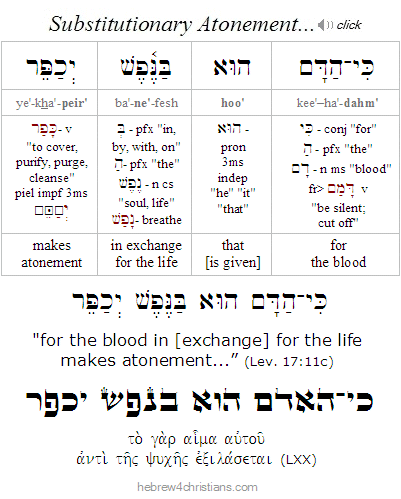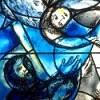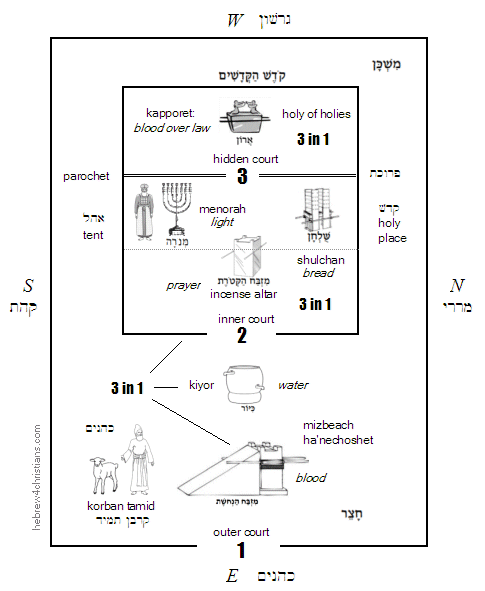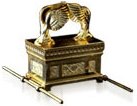|
"The Life is in the blood..." (Lev. 17:11). The "Day of Atonement" is the English translation for Yom Kippurim (ūÖūĢų╣ūØ ūöųĘūøų╝ų┤ūżų╝ų╗ū©ų┤ūÖūØ). The shoresh (root) for the word "kippur" is kafar (ūøų╝ųĖūżųĘū©), which probably derives from the word kofer, meaning "ransom." This word is parallel to the word "redeem" (Psalm 49:7) and means "to exchange by offering a substitute." The great majority of usages in the Tanakh concern "making an atonement" by the priestly ritual of sprinkling of sacrificial blood to cleanse from sin or defilement (i.e., tahora). The blood of the sacrifice was given in exchange for the life of the worshiper (the "life-for-life" principle). This symbolism is clarified when the worshiper leaned his hands on the head of the sacrifice (semichah) while confessing sin (Lev. 16:21; 1:4; 4:4, etc.). The shoresh also appears in the term kapporet [the "Mercy Seat," but better rendered as simply the place of blood covering]. The kapporet was the golden cover of the Holy Ark in the Holy of Holies of the Tabernacle (or Temple) where the sacrificial blood was presented to cleanse the people from their sins.
ūøų╝ų┤ūÖ ūĀųČūżųČū®ūü ūöųĘūæų╝ųĖū®ūéųĖū© ūæų╝ųĘūōų╝ųĖūØ ūöų┤ūĢūÉ
ūĢųĘūÉų▓ūĀų┤ūÖ ūĀų░ū¬ųĘū¬ų╝ų┤ūÖūĢ ū£ųĖūøųČūØ ūóųĘū£ųŠūöųĘū×ų╝ų┤ū¢ų░ūæų╝ųĄūŚųĘ
ū£ų░ūøųĘūżų╝ųĄū© ūóųĘū£ųŠūĀųĘūżų░ū®ūüū¬ųĄūÖūøųČūØ
ūøų╝ų┤ūÖųŠūöųĘūōų╝ųĖūØ ūöūĢų╝ūÉ ūæų╝ųĘūĀų╝ųČūżųČū®ūü ūÖų░ūøųĘūżų╝ųĄū©
kee ┬Ę ne┬Ęfesh ┬Ę ha┬Ębah┬Ęsahr ┬Ę ba┬Ędahm ┬Ę hee
va┬Ęa┬Ęnee ┬Ę ne┬Ęta┬Ęteev ┬Ę la┬Ękhem ┬Ę al ┬Ę ha┬Ęmeez┬Ębei┬Ęach
le┬Ękha┬Ępeir ┬Ę al ┬Ę naf┬Ęshoh┬Ętei┬Ękhem
kee ┬Ę ha┬Ędahm ┬Ę hoo ┬Ę ba┬Ęne┬Ęfesh ┬Ę ye┬Ękha┬Ępeir

"For the life of the flesh is in the blood,
and I have given it for you on the altar
to atone for your souls,
for it is the blood that makes atonement by the life."
(Lev. 17:11)

Hebrew Study Card
The blood of Messiah ransoms our souls from death, brings us near to the Divine Presence, and cleanses us from all sin (Lev. 17:11; Rom. 3:25; Heb. 9:22; Eph. 1:7; Col. 1:14; 1 John 2:2). The voice of his blood cries out on our behalf (Heb. 12:24), and his life was given in exchange for ours: "For our sake he made him to be sin who knew no sin, so that in him we might become the righteousness of God" (2 Cor. 5:12). We "lean into" Yeshua, confessing our sins, and are cleansed from all unrighteousness (1 John 1:9). In the New Testament Yeshua is called the "atonement" (ß╝▒╬╗╬▒Žā╬╝ßĮ╣Žé) for our sins (1 John 2:2), a Greek word that was used in the Septuagint (i.e., LXX) to translate the Hebrew word kippurim in the Torah (Lev. 25:9). The Septuagint uses the same word (ß╝▒╬╗╬▒Žā╬╝ßĮ╣Žé) to translate the Hebrew word for selichah (forgiveness), for example: "But with you there is forgiveness (ūöųĘūĪų╝ų░ū£ų┤ūÖūŚųĖūö), that you may be held in awe" (Psalm 130:4). Just as the blood was sprinkled upon the kapporet (cover of the Ark of the Covenant) in the Holy of Holies during the Yom Kippur ritual, so the blood of Messiah was sprinkled the heavenly kapporet, the very altar of Almighty God, to secure for us everlasting redemption and healing...
 |
"Come now and reason with the LORD. Though your sins are as scarlet, they shall be as white as snow" (Isa. 1:18). The blood of bulls and goats could never fully remove our sins since they did not represent the very life of God poured out on our behalf (Heb. 10:4). God chose the ultimate "cleansing agent" for sin by shedding the precious blood of His own Son for the sake of our atonement (1 Cor. 15:3-4; Rom. 5:11). The blood of Yeshua truly cleanses us from the stain of our sins (Heb. 10:12-14). We make "spiritual contact" with the sacrificial blood of Yeshua through faith -- by being "baptized into His death" and identifying with Him as our Sin-Bearer before God. We then are delivered from the law's verdict against us and accepted into the Kingdom of God (Rom. 4:25; 2 Cor. 5:21; Col. 1:13-14, 2:10-15).
ū£ų░ūøūĢų╝ųŠūĀųĖūÉ ūĢų░ūĀų┤ūĢų╝ųĖūøų░ūŚųĖūö ūÖūÉū×ųĘū© ūÖų░ūöūĢųĖūö
ūÉų┤ūØųŠūÖų┤ūöų░ūÖūĢų╝ ūŚų▓ūśųĖūÉųĄūÖūøųČūØ ūøų╝ųĘū®ų╝ūüųĖūĀų┤ūÖūØ ūøų╝ųĘū®ų╝ūüųČū£ųČūÆ ūÖųĘū£ų░ūæų╝ų┤ūÖūĀūĢų╝
ūÉų┤ūØųŠūÖųĘūÉų░ūōų╝ų┤ūÖū×ūĢų╝ ūøųĘū¬ų╝ūĢų╣ū£ųĖūó ūøų╝ųĘū”ų╝ųČū×ųČū© ūÖų┤ūöų░ūÖūĢų╝
le┬Ękhoo ┬Ę nah ┬Ę ve┬Ęnee┬Ęvah┬Ękhe┬Ęchah ┬Ę yoh┬Ęmar ┬Ę Adonai
eem ┬Ę yee┬Ęhe┬Ęhoo ┬Ę cha┬Ętah┬Ęei┬Ękhem ┬Ę ka┬Ęshah┬Ęneem ┬Ę ka┬Ęsheh┬Ęleg ┬Ę yal┬Ębee┬Ęnoo
eem ┬Ę ya┬Ęa┬Ędee┬Ęmoo ┬Ę kha┬Ętoh┬Ęlah ┬Ę ka┬Ętze┬Ęmer ┬Ę yee┬Ęhe┬Ęyoo

"Come now, let us reason together, says the LORD:
though your sins are as scarlet, they shall be as white as snow;
though they are red like crimson, they shall become like wool."
(Isa. 1:18)

Hebrew Study Card
In light of the full counsel of God given in our Scriptures, it is clear, chaverim, that the idea of atonement (ūøūżū©ūö), though adumbrated in the Torah and Nakh, is perfected, completed, and realized in Yeshua our LORD, who is the Center and Source of all true Torah and the perfect expression of the redemptive love of the Father... If you think you are affecting "a good decree" by your teshuvah and religious rituals, you are in serious error. Rabbinical Judaism is not the way to life, friends. A "a good and final sealing" (ūÆų╝ų░ū×ųĘū© ūŚųĘū¬ų┤ūÖū×ųĖūö ūśūĢų╣ūæųĖūö) in God's Book of Life is found only in Yeshua: ß┐Š╬¤ ß╝öŽćŽē╬Į ŽäßĮĖ╬Į Žģß╝▒ßĮĖ╬Į ß╝öŽć╬Ą╬╣ ŽäßĮ┤╬Į ╬ČŽēßĮĄ╬Į┬Ę ßĮü ╬╝ßĮ┤ ß╝öŽćŽē╬Į ŽäßĮĖ╬Į Žģß╝▒ßĮĖ╬Į Žä╬┐ß┐” ╬Ė╬Ą╬┐ß┐” ŽäßĮ┤╬Į ╬ČŽēßĮ┤╬Į ╬┐ßĮÉ╬║ ß╝öŽć╬Ą╬╣ (1 John 5:21). Therefore give glory to the LORD God of Israel and honor the sacrificial life of his beloved Son (John 5:24). Yom Kippur is a time of great joy for us because of Yeshua's sacrifice as our great High Priest after the order of Malki-Tzedek, where he presented his own blood "behind the veil," and therefore secured everlasting atonement on our behalf at the cross. Because of our connection with Yeshua, we are forever made a part of God's glorious "story of redemption." ß╝Ī╬╝╬Ąß┐¢Žé ╬│ßĮ▒Žü ß╝ÉŽā╬╝╬Ą╬Į ß╝Ī ŽĆ╬ĄŽü╬╣Žä╬┐╬╝ßĮĄ, ╬┐ß╝▒ ŽĆ╬Į╬ĄßĮ╗╬╝╬▒Žä╬╣ ╬Ė╬Ą╬┐ß┐” ╬╗╬▒ŽäŽü╬ĄßĮ╗╬┐╬ĮŽä╬ĄŽé, ╬║╬▒ßĮČ ╬║╬▒ŽģŽćßĮĮ╬╝╬Ą╬Į╬┐╬╣ ß╝É╬Į ŽćŽü╬╣ŽāŽäß┐Ę ßŠĮ╬Ö╬ĘŽā╬┐ß┐”, ╬║╬▒ßĮČ ╬┐ßĮÉ╬║ ß╝É╬Į Žā╬▒Žü╬║ßĮČ ŽĆ╬ĄŽĆ╬┐╬╣╬ĖßĮ╣Žä╬ĄŽé┬Ę - "For we are the circumcision, who worship by the Spirit of God and glory in Yeshua the Messiah and put no confidence in the flesh" (Gal. 3:3). Blessed be the Name of Yeshua forever and ever...
 |
|





